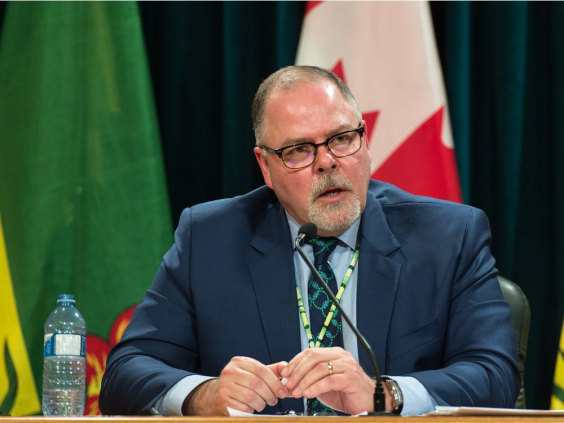Updated as of 5:45 p.m., Tuesday, May 5.
The Saskatchewan Health Authority (SHA) unveiled its phased approach to resuming services on Tuesday. Many services, such as non-urgent surgeries and mental health group programming, have been put on hold since the beginning of the COVID-19 pandemic.
The plan consists of four phases, the first of which begins on May 19. The last three phases don’t have dates yet.
“While there are risks to service resumptions, there are also risks when people are not getting the every day health services that they need,” said the SHA’s Chief Medical Officer, Dr. Susan Shaw.
“Make no mistake, this plan is necessary,” added CEO Scott Livingstone. He said patients’ conditions can escalate the longer services are postponed.
Phase one restores some every day health services and expands surgeries and diagnostic imaging.
The every day health services that will become available include home care, where moderate-risk clients are given priority, and public health inspections.
It also includes mental health and addictions services. The plan says patients will be given the option of an in-person appointment if necessary, therapeutic and day programming for groups of less than 10 people will resume and mental health short stay units will reopen.
Surgeries are expanding from emergency and three-week urgent cases to six-week urgent cases—examples are cataracts, hysterectomy, cochlear and thoracic surgeries. This phase also includes endoscopies.
The SHA will also increase outpatient volumes for diagnostic imaging, such as MRIs, x-rays and ultrasounds.
Phase two of the plan will see the reopening of SHA-operated specialty clinics. Staff will continue to provide care virtually when possible.
These services include electrophysiology, respiratory, eye centre testing, dermatology clinics, cast clinics and high risk antenatal clinics.
In phase three, the SHA will continue to expand every day health services.
This phase includes the resumption of chronic disease management, wellness programs and stroke prevention. Also included is opioid agonist therapy, further mental health and addictions services, learner placements and specialized services for clients with developmental disabilities, autism and brain injuries.
The fourth and final phase of the plan is resuming all services to ‘normal’ operations.
This includes the addition of other scheduled elective and postponed surgeries, as well as reopening hip and knee outpatient clinics.
Livingstone said, as of Tuesday, the plan will move forward in Lloydminster and Prince Albert.
The hospitals in those communities are currently dealing with outbreaks, although the cases have been isolated and controlled. Livingstone added many of the people identified as contacts in the outbreaks are coming to the end of their 14 days in self-isolation.
“(The plan) will not be a one size fits all approach, it’s more of a framework. It will be mindful of the different local dynamics in the province, including accounting for the outbreaks that may slow the service resumption in certain areas of Saskatchewan,” he said.
“We will proceed thoughtfully to maintain a balance between providing care to all people while ensuring the needs of our COVID-19 patients are met,” added Shaw.
The plan also outlines “triggers” that show when the SHA can move forward or should move backward.
Things that give the green light to move forward include staff availability, physician availability, supply chain availability and current capacity.
On the other hand, things that signal slowing down include prioritization to maintain services related to COVID-19, an increase of COVID-19 patients in hospital, re-deployment of staff, workforce illness impacts, supply chain availability, public health orders, community transmissions, community outbreaks and possible fire or flood disasters.
CUPE raises concerns over SHA’s resumption plan
The union representing a wide range of health care workers is concerned that there will not be enough staff to respond to both the pandemic and the reopening of usual services.
A news release said many of the staff at testing and assessment centres had been redeployed from services that were temporarily shut down.
“The resumption of services plan for health care says that there must be adequate human resources for current operations, growing number of outbreaks, and management of COVID-19 across the continuum of care,” said CUPE Local 5430 President Sandra Seitz.
“How is that possible when the people doing this work will be returning to their previous work?”
The release said the union will continue to work with the Ministry of Health to address its concerns.
CUPE Local 5430 represents over 14,000 workers who contribute to the well-being of hospital patients, long-term care residents and home care clients.


